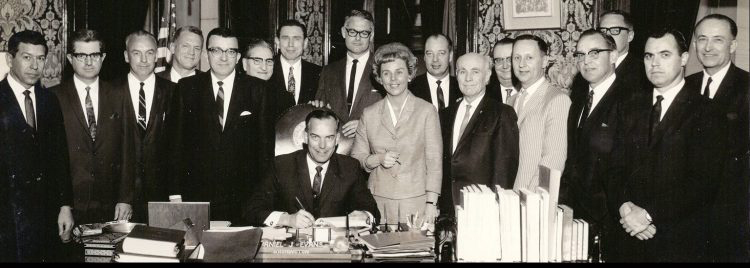College History
The first classes were held in the Edison Vocational Technical Institute on Capitol Hill, when Seattle Community College—now Seattle Central College—opened in 1966 as part of the public school system.
Seattle Colleges serves all of metropolitan Seattle and its surrounding communities and comprises the largest community college district in the state, educating more than 35,000 students each year.
Seattle Central College
Seattle Community College—now Seattle Central College—opened in 1966 as part of the public school system. As the first two-year college in the city, and the 19th in Washington state, its establishment filled a huge unmet need for affordable education and career training for the city’s residents. No longer would people have to travel to colleges in Everett, Bremerton, or other areas outside of Seattle. The first classes were held in the Edison Vocational Technical Institute in the Capitol Hill neighborhood.
Although Seattle Central was established in 1966, its roots run much deeper. Broadway High School, the city’s first high school, opened in 1902 and originally stood on the current Capitol Hill campus. When it closed in 1946, shortly after World War II ended, Edison Technical Institute opened on that site to serve thousands of veterans returning from the war with vocational training and education, helping them transition to civilian life.
The State Community College Act of 1967 established college districts apart from the public schools, with a mandate to provide an open door to education for all who seek it. A long-range plan called for three campuses in the city, and planning began immediately for North Seattle College and South Seattle College.

Community College Act signing ceremony, 1967
South Seattle College
South Seattle College was established in July of 1969. In that first year the college held classes at various locations, including the site now known as its Georgetown Campus, West Seattle High School, and a site on 3rd Avenue. Construction began at South’s current 16th Avenue Location in West Seattle in January of 1970, with the first completed building opening later that year to offer aviation related classes.
North Seattle College
North Seattle College first opened its doors to the public in fall 1970. The campus is located in the Aurora-Licton Springs area of North Seattle, an area once heavily forested and filled with numerous mineral springs, bogs, and marshes. The original campus master plan was designed to be constructed in three phases, beginning with what are now the Instruction Building, College Center, Library, Health Sciences and Student Resources, and Arts and Sciences buildings.
Three Colleges, One District
By September 1970, all three colleges opened together for the first time as a multicampus district. Seattle Vocational Institute, affiliated with Central, joined the district in 1991 under the state’s Workforce Training and Education Act.
The district also includes five specialized training centers located throughout the city:
- Health Education Center, Seattle Maritime Academy, and Wood Technology Center, affiliated with Central.
- Georgetown Campus and NewHolly Learning Center, affiliated with South.
Students choose from an array of more than 130 academic and career and technical education (CTE) programs, the largest number in the state. The curriculum has led the way as the Puget Sound area moved from a manufacturing and resource-based economy to information-based industries.
Like the region, the college population is dynamic. The student body is the most diverse in the Northwest, reflecting nearly 80 different languages spoken in homes throughout the city.
By design, each of the colleges reflects its community. While the colleges are an integral part of their neighborhoods and offer certain unique educational programs, all are comprehensive and offer programs in college transfer, career and technical training, adult basic education, and continuing education.
Seattle Colleges acknowledges that its campuses exist on the lands that are the traditional home of the Coast Salish people, the traditional home of all tribes and bands within the Duwamish, Suquamish, Tulalip, and Muckleshoot nations, past and present. We honor with gratitude the land itself, the people, and their legacy.